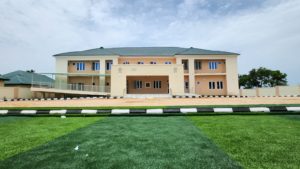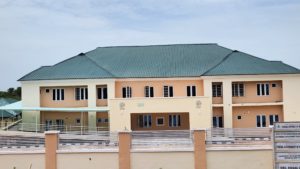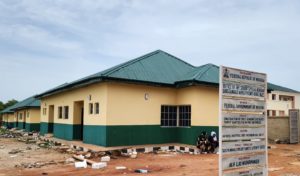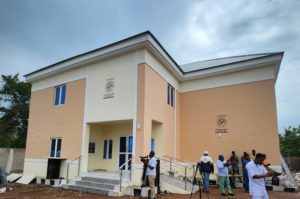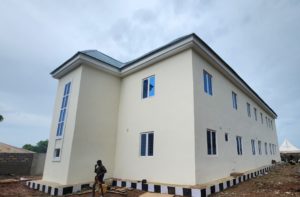Health
Commendations As OSSAP-SDGs Delivers Healthcare Facilities In Kwara Communities
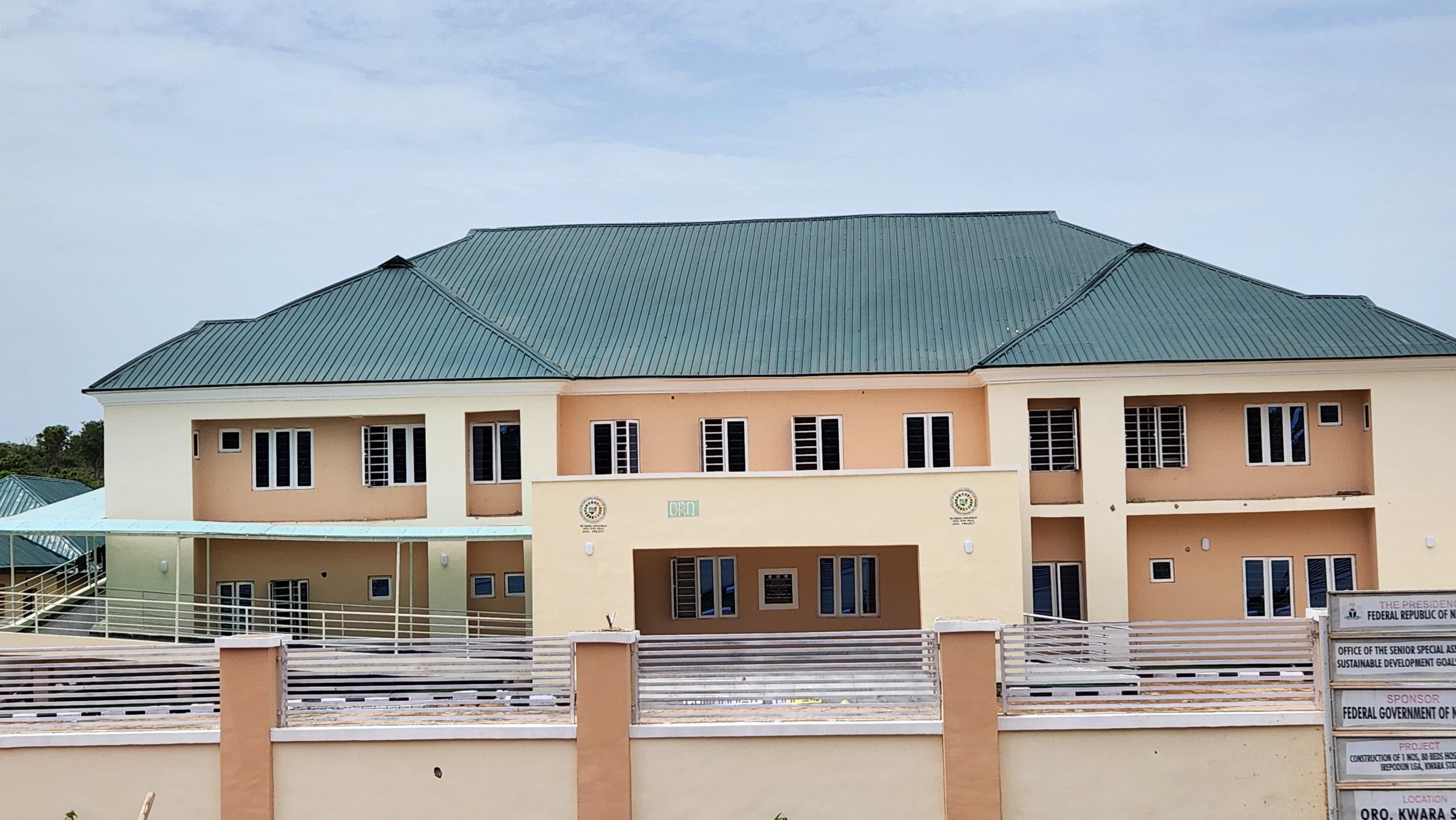
By Biztellers
As part of its bid to help advance the health goals of the 2030 Agenda for Sustainable Development and the Sustainable Development Goals, the Office of the Senior Special Assistant to the President on Sustainable Development Goals, OSSAP-SDGs, has unveiled an 80-bed and 40-bed state-of-the-art healthcare facilities in Oro and Igbaja communities of Irepolodun and Ifelodun Local Government areas of Kwara State respectively.
The two facilities are part of the many healthcare facilities constructed and fully equipped by the OSSAP-SDGs already contributing to improvement of health outcomes and indices across the country.
The two facilities were commissioned separately at events attended by members of Kwara State Executive Council, the Minister of Information and Culture, Alhaji Lai Mohammed, traditional and religious leaders, top officials of OSSAP-SDGs and other stakeholders in the two communities.
Speaking during the inauguration of the 80-bed healthcare facility in Oro, the Senior Special Assistant to the President on Sustainable Development Goals, SSAP-SDGs, Princess Adejoke Orelope-Adefulire noted that her Office has prioritized interventions with multi-dimensional effects, such as basic healthcare, vocational skills development, and education provision as part of bid to actualize the promise of President Buhari to lift 100 million Nigerians out of poverty in 10 years.
“Our goal is to create a ripple effect that will impact and improve the lives of many Nigerians as part of the promise. Such interventions include facilities like this one we are commissioning today,” said the SSAP-SDGs.
She noted that the 80-Bed facility was established with a clear mission to improve child health, reduce maternal mortality, and contribute to SDG 3 by accelerating progress towards ensuring healthy lives and promoting well-being for all ages.
“The right to healthcare is a fundamental human right, and access to healthcare is a top priority for the Nigerian government in order to leave no one behind. Ladies and gentlemen, this 80-Bed facility we are commissioning today is dedicated to providing high-quality care and advancing public health, towards a healthier and more equitable future for all,” Princess Orelope-Adefulire said.
The presidential adviser further noted that the facility is equipped with a theatre, incubators, ventilators, phototherapy machines, patient monitors, children’s beds, examination beds, a 100KVA generator, and powered with solar streetlights; this hospital in a clear demonstration of the commitment of the Buhari’s administration to provide quality healthcare services to the people of Oro and its environs.
“The establishment of this 80-Bed facility is not only contributing to the achievement of SDG 3, but also positively impacting related SDGs. This hospital will serve as a catalyst for the overall development of the community, reducing infant and maternal mortality rates, improving access to healthcare services, and enhancing the overall health of the people,” the SSAP-SDGs said while appealing for continuous investments healthcare infrastructure for the advancement of SDG 3 on the health and well-being of the citizens.
She also appealed to the management and staff of the facility to ensure that it is effectively managed and maintained, and that the people of Oro and its environs have access to quality healthcare services.
Speaking at the event, the Minister of Information and Culture, Alhaji Lai Mohammed noted that President Buhari’s administration has initiated series of actions directed at expanding access to healthcare for Nigerians.
He also noted that Kwara has previously benefitted from the Buhari’s administration investments in the health sector with a 100-bed Mother and Child Hospital equipped with state of the art facilities and delivered in Eiyen-korin in Asa Local Government Area of Kwara State also by the Office of the Senior Special Assistant to the President on Sustainable Development Goals, to reduce maternal mortality as well as infant and neo-natal deaths. The minister said the 80-bed hospital inaugurated on the sidelines of 2023 Oro Day was equally equipped to promote the heath of mothers and children.
“This development is in line with PMB’s administration commitment to providing health facilities to cater for the needs of Nigerians. I am told that the SDGs Office constructed over 35 of the 100 bed hospitals spread across the country. It also constructed over twenty 80-bed hospitals and numerous primary health centers across the country,” he said
The Minister also commended the SDGs Office for the giant strides it has recorded in the provision of social services across the country particularly in remote places.
Speaking in the same vein, the state Governor, AbdulRahman AbdulRazaq commended President Buhari for the giant stride his administration has recorded in health sector and infrastructure development across the country.
Represented by his Commissioner for Health, Dr Raji Razaq, the governor also thanked the minister for facilitating the projects and the OSSAP-SDGs for executing them.
In Igbaja, the 40-bed hospital is said to be the first major intervention in the town in any sector by the Federal Government.
The traditional ruler of the community, Oba Ahmed Babalola, the Elese of Igbaja Land who spoke through the President of Igbaja Progressive Union, Pastor Oluwatoyin Alabi described the event as historical.
“We owe a huge gratitude to the minister who incidentally is a proud son of Igbaja and on many occasions has attested to the fact that Igbaja is his second home. This project will go a long way to combat infant mortality in our community and further enhance Sustainable Development Goals. The citing of the hospital will also bring reliefs not only to Igbaja, but the entire Ireseland of Adanla, in, Offa-Iresse and other adjourning communities,” he said.
Health
Nigeria Strengthens Airport Screenings Amid Spread Of China’s HMPV Virus

The Nigerian government has increased surveillance at major international airports in response to the outbreak of Human Metapneumovirus (HMPV), recently discovered in China and now spreading to several countries, including India, Hong Kong, Malaysia, and Kazakhstan.
Port health officers have begun screening arriving passengers for symptoms of the virus, following a directive from the Minister of Health, Muhammad Ali Pate.
According to a source at Murtala Muhammad International Airport (MMIA), Lagos, “There is no cause for alarm as the Port Health Service has been mandated to start screening the passengers, and we are not taking anything to chance.”
The Human Metapneumovirus has sparked global concern after over 5,000 hospitalisations were reported in the United Kingdom due to respiratory infections linked to the virus.
READ MORE: Speed Darlington Sues IGP For N300M Over Unlawful Detention
The Nigeria Centre for Disease Control and Prevention (NCDC) has issued an advisory to monitor global developments in collaboration with the Ministry of Health and Social Welfare. Dr Jide Idris, Director-General of the NCDC, stated, “We aim to provide timely, accurate information and guidance to keep the Nigerian public informed and prepared.”
The agency also debunked rumours that the World Health Organization (WHO) had declared HMPV a Public Health Emergency of International Concern (PHEIC), urging the public to disregard such claims.
Screenings have commenced at key airports, including MMIA, Lagos, and Nnamdi Azikiwe International Airport, Abuja. Despite the heightened precautions, the Nigeria Civil Aviation Authority (NCAA) has yet to issue a formal circular to airlines on mandatory passenger checks.
The surge in respiratory infections globally has heightened pressure on health systems. In the UK alone, flu cases rose sharply over the holiday period, with over 5,000 hospitalisations reported by December 29, 2024. There has also been an increase in hospitalisations linked to COVID-19, norovirus, and RSV.
As global temperatures drop and respiratory infections continue to rise, Nigerian authorities remain vigilant, aiming to prevent the spread of HMPV within the country.
Health
Africa Leads Global Progress In HIV/AIDS Fight, Says WHO
Africa has made remarkable progress in reducing new HIV infections and AIDS-related deaths, according to the World Health Organization (WHO).
Dr. Matshidiso Moeti, WHO Regional Director for Africa, highlighted these achievements in her statement to mark this year’s World AIDS Day, themed “Take the Rights Path: My Health, My Right” on Friday.
READ ALSO: Atiku Gloats Over AUN’s Achievements Ahead Of 20th Anniversary
For the first time in 2023, the number of new HIV infections outside sub-Saharan Africa surpassed those within the region, underscoring Africa’s significant progress.
The continent is also a global leader in advancing the 95-95-95 UNAIDS targets aimed at ensuring 95% of people living with HIV know their status, 95% of those diagnosed are on treatment, and 95% of those treated achieve viral suppression.
“Seven countries have already achieved the targets, with the overall rating for the region currently at 90-82-76,” said Dr. Moeti. “About 21.3 million people are now on antiretroviral treatment, raising their life expectancy.”
Botswana and Namibia were recognized for achieving significant milestones in preventing mother-to-child HIV transmission, earning silver and bronze tier statuses, respectively, under WHO’s Path to Elimination of HIV initiative.
African countries are also adopting innovative prevention methods, including oral and long-acting injectable pre-exposure prophylaxis (PrEP) and the dipivefrine vaginal ring.
Dr. Moeti stressed that while these tools are vital, their impact depends on accessibility.
“The value of these innovations depends on their universal accessibility,” she stated, emphasizing the need for investments and policy reforms.
Dr. Moeti called for an end to stigma and discrimination, which she said continue to hinder progress.
“We have a collective obligation to protect human rights, specifically ensuring that health care is available to everyone, without any discrimination, regardless of their HIV status, background, gender, or where they live. Stigma and discrimination cannot be allowed to undermine the gains and impede our progress.”
While celebrating these advancements, Dr. Moeti noted that disease outbreaks across the region pose a challenge to already overburdened health systems.
She emphasized the importance of strong, integrated, and person-centered health care systems to meet the needs of vulnerable populations.
“Let’s take this opportunity today to acknowledge the progress, but to also renew our joint commitment to eliminating HIV.
By protecting everyone’s right to health, and reducing new HIV infections, we can achieve an AIDS-free generation and ensure the sustainability of the HIV response,” she urged.
Dr. Moeti also highlighted the crucial role of communities in shaping strategies to eliminate barriers to care.
“We must ensure their voices are heard,” she said, emphasizing that the collective efforts of governments, partners, civil society, health care providers, and communities are essential in the fight against HIV/AIDS.
Health
NTDs: Nigeria Needs $19m To Combat Health Crisis, Officials Warn
Nigeria requires an estimated $19 million to effectively combat Neglected Tropical Diseases (NTDs), according to Fatai Oyediran, the National Coordinator for NTDs at the Federal Ministry of Health and Social Welfare.
Speaking at a high-level advocacy meeting in Abuja on Thursday, Oyediran highlighted the urgent need for funding to support the country’s NTD control efforts.
“We developed our NTD master plan in 2023, which runs through 2027, and $19 million is what we need to implement it effectively,” Oyediran stated, emphasizing that adequate investment is crucial to addressing these diseases, which continue to affect millions in Nigeria.
READ ALSO: UK Opens Africa’s Largest Visa Application Centre In Lagos
The World Health Organisation defines NTDs as a diverse group of diseases caused by viruses, bacteria, parasites, fungi, and toxins, often leading to devastating health, social, and economic consequences.
These diseases primarily affect impoverished communities in tropical areas and are estimated to impact over one billion people globally.
In Nigeria, NTDs are responsible for a significant portion of the continent’s health burden, with the country contributing to 50% of Africa’s NTD cases and 25% of the global total.
Oyediran underscored the need for a united approach to secure funding and mobilize resources for Nigeria’s NTD control programs.
“One major challenge in addressing NTDs has been inadequate funding. There are about 21 diseases grouped under NTDs; each of them has its own peculiarities. Adequate funding is essential to effectively implementing all the strategies of controlling NTDs,” he explained.
The National Coordinator also called on both federal and state governments to allocate specific budgetary provisions for NTDs.
“Most states currently lack budgetary provisions for these diseases, and this is why we are engaging with health commissioners today. They are expected to communicate with their governors and ministries of budget and planning to establish a dedicated budget line for NTDs,” he said.
Stuart Halford, Director of Advocacy and Resource Mobilisation at United to Combat NTDs, echoed Oyediran’s call for funding, emphasizing that eliminating NTDs should be prioritized due to their severe economic impact.
“There are many health priorities, but eliminating NTDs is equally important because they contribute to economic and productivity losses,” Halford said.
Progress is being made in some states, such as Abia, where NTDs like onchocerciasis and lymphatic filariasis have been largely controlled.
Abia State Health Commissioner, Prof. Enoch Uche, revealed that the state was certified in 2022 for breaking the transmission of onchocerciasis and lymphatic filariasis.
“We began mass administration of drugs as a form of preventive measure, which lasted for 10 years. In 2022, Abia state was certified to have broken the transmission of onchocerciasis and lymphatic filariasis,” he said.
Kwara State has also made strides in the fight against NTDs.
The state’s Health Commissioner, Amina El-Imam, noted that Kwara has successfully eradicated lymphatic filariasis and onchocerciasis, despite the many other health challenges the state faces.
“NTDs are so-called because they have not received appropriate attention and funding over the past years. Unless we refocus on them, we will not be able to achieve eradication as intended,” she warned.

